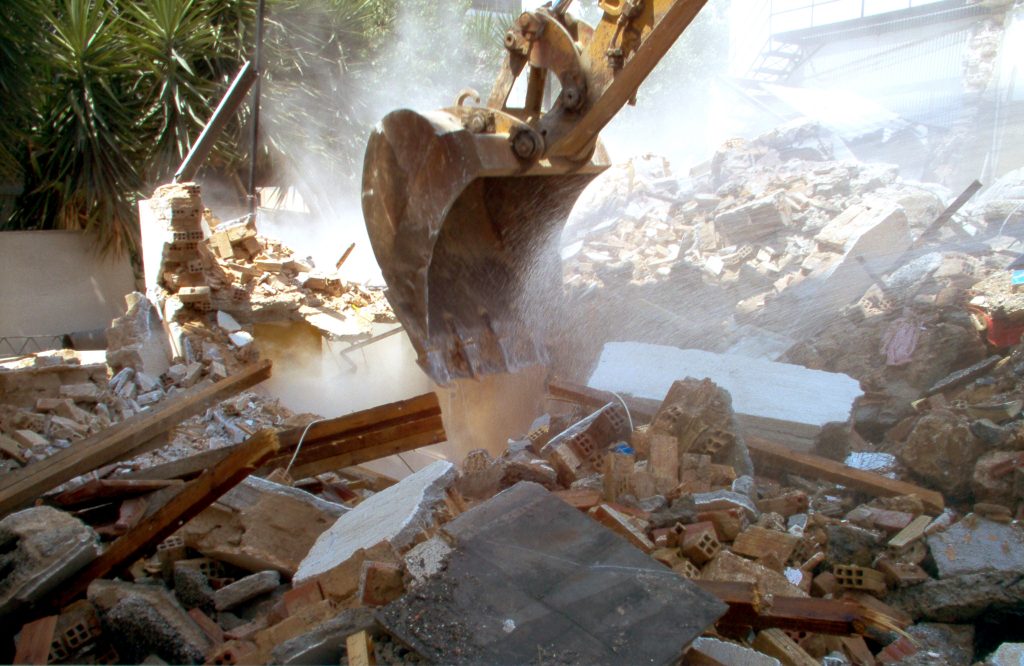 Wrongful demolition is a cause of action rarely invoked because the events giving rise to such an action rarely occur. Essentially, a claim for wrongful demolition arises when a plaintiff’s property was mistakenly or wrongfully demolished. In the following case, Morgan Moss found himself in the unique position of asserting such a claim against the town of Rayville, Louisiana. See La. C.C. art. 2315; see also Hornsby v. Bayou Jack Logging, 902 So.2d 361 (La. 2005).
Wrongful demolition is a cause of action rarely invoked because the events giving rise to such an action rarely occur. Essentially, a claim for wrongful demolition arises when a plaintiff’s property was mistakenly or wrongfully demolished. In the following case, Morgan Moss found himself in the unique position of asserting such a claim against the town of Rayville, Louisiana. See La. C.C. art. 2315; see also Hornsby v. Bayou Jack Logging, 902 So.2d 361 (La. 2005).
One morning, while in his home Mr. Moss heard some strange noises coming from across the street. When he walked out of his house to inspect the source of the noise he discovered that his storage property across the street was being demolished by town workers. The town had somehow mistaken Mr. Moss’s property for another property that was scheduled to be demolished. Significantly, Mr. Moss filmed the town workmen but did not try to stop the demolition.
Mr. Moss presented his case to the Trial Court where he won a judgment for only $5000 for the loss of his property. Unsatisfied, Mr. Moss appealed to the Louisiana Second Circuit Court of Appeal hoping to recover more. Any good attorney knows to speak to judges with deference and respect. Along those lines, it’s unwise to make frivolous arguments or to embellish facts.
 Louisiana Personal Injury Lawyer Blog
Louisiana Personal Injury Lawyer Blog


 A primary concern that all business owners have is how to insulate themselves from any improper actions that their business engages in. Without some mechanism to separate the actions of the business from the business owner, a business owner would be personally liable for the business’s actions and could face legal claims against him or her for actions that the business engaged in. States, recognizing this problem, created many forms of corporate structures with varying levels of liability protection. Examples of such corporate structures are limited liability companies (L.L.C.), professional corporations (P.C.), and C corporations. While these, and other types of corporate structures, provide business owners with insulation from liability, business owners could still be personally liable for their company’s actions if those actions fall under a narrow set of circumstances. Recently, the Louisiana Supreme Court addressed whether one of these narrow circumstances occurred when determining whether an owner of a home construction company was personally liable for the actions of the company.
A primary concern that all business owners have is how to insulate themselves from any improper actions that their business engages in. Without some mechanism to separate the actions of the business from the business owner, a business owner would be personally liable for the business’s actions and could face legal claims against him or her for actions that the business engaged in. States, recognizing this problem, created many forms of corporate structures with varying levels of liability protection. Examples of such corporate structures are limited liability companies (L.L.C.), professional corporations (P.C.), and C corporations. While these, and other types of corporate structures, provide business owners with insulation from liability, business owners could still be personally liable for their company’s actions if those actions fall under a narrow set of circumstances. Recently, the Louisiana Supreme Court addressed whether one of these narrow circumstances occurred when determining whether an owner of a home construction company was personally liable for the actions of the company. Desiring to be friendly, you may allow your neighbors to use a portion of your land in order to make their lives a little easier. You allow your neighbors to continue to use your land for some time, but now you want privacy on your property. At this point you would most likely ask your neighbor to stop using your land, but what do you do when they refuse? What do you do when your new neighbor claims ownership of the portion of land that you allowed them to use? Defending ownership rights against presumptuous neighbors was a recent issue in a case out of St. Landry Parish.
Desiring to be friendly, you may allow your neighbors to use a portion of your land in order to make their lives a little easier. You allow your neighbors to continue to use your land for some time, but now you want privacy on your property. At this point you would most likely ask your neighbor to stop using your land, but what do you do when they refuse? What do you do when your new neighbor claims ownership of the portion of land that you allowed them to use? Defending ownership rights against presumptuous neighbors was a recent issue in a case out of St. Landry Parish.  Imagine that you own several rental properties, and one day some of the properties get severely damaged by a hurricane. You slowly try to repair the damaged properties, but your local government decides to demolish it, without notifying you first. That is what happened to a St. Bernard Parish, Louisiana man named Glenn Sandrock.
Imagine that you own several rental properties, and one day some of the properties get severely damaged by a hurricane. You slowly try to repair the damaged properties, but your local government decides to demolish it, without notifying you first. That is what happened to a St. Bernard Parish, Louisiana man named Glenn Sandrock. Imagine you owned acres of lush and valuable trees. Then imagine that one day, you discover your land to be completely barren, the valuable trees almost completely removed. Even worse, you have no real, viable recourse against the thieves who cut down and hauled off the trees because of a very strict, literal, narrow interpretation of the terms of a statute. Instead, you are left with stripped land and a possibly uncollectable judgment.
Imagine you owned acres of lush and valuable trees. Then imagine that one day, you discover your land to be completely barren, the valuable trees almost completely removed. Even worse, you have no real, viable recourse against the thieves who cut down and hauled off the trees because of a very strict, literal, narrow interpretation of the terms of a statute. Instead, you are left with stripped land and a possibly uncollectable judgment.  In Louisiana, a failure to pay your property taxes can result in your property being subject to a tax sale. This can cause a tremendous headache. Though the Louisiana Constitution and Revised Statutes provide that the government’s right to proceed to a tax sale expires three years after the last day of the year in which the taxes were due, one New Orleans property owner was sent a tax bill including unpaid taxes which seemingly should have been expired.
In Louisiana, a failure to pay your property taxes can result in your property being subject to a tax sale. This can cause a tremendous headache. Though the Louisiana Constitution and Revised Statutes provide that the government’s right to proceed to a tax sale expires three years after the last day of the year in which the taxes were due, one New Orleans property owner was sent a tax bill including unpaid taxes which seemingly should have been expired. Even if a property is zoned for commercial purposes, a city may discretionarily deny a business from buying and developing that property if the city determines it is against the public interest. The city of Shreveport, Louisiana was challenged when they denied a Dollar General’s site plan to develop a commercially zoned, “use by right” 1.13-acre lot. While Dollar General’s developer, GBT Realty Corporation, petitioned the trial and appellate courts for damages resulting from loss of a business opportunity, the courts ruled that the city was immune from tort liability when a city exercises its discretion in the use of its commercially zoned properties.
Even if a property is zoned for commercial purposes, a city may discretionarily deny a business from buying and developing that property if the city determines it is against the public interest. The city of Shreveport, Louisiana was challenged when they denied a Dollar General’s site plan to develop a commercially zoned, “use by right” 1.13-acre lot. While Dollar General’s developer, GBT Realty Corporation, petitioned the trial and appellate courts for damages resulting from loss of a business opportunity, the courts ruled that the city was immune from tort liability when a city exercises its discretion in the use of its commercially zoned properties.  Buying or selling a home is a complicated process filled with legal and practical pitfalls that can cause problems for both the buyer and seller. One of the most important steps that a person engaged in a transaction with potential legal issues must take is to speak with a good lawyer who can navigate the process and make sure their rights and interests are protected to the fullest extent possible. A good lawyer can also make sure that the buyer or seller understands all the implications of contractual language. In a home sale, every word in the agreement is important and can alter the rights of everyone involved in the transaction. One or two seemingly insignificant words can entirely change the rights and protections that a party may normally receive under the law. The Prejeans found out the hard way. In their case, a combination of a few termites, some water, and the two little words “as is,” led to a massive headache and loss of money when they purchased a home in Houma, Louisiana.
Buying or selling a home is a complicated process filled with legal and practical pitfalls that can cause problems for both the buyer and seller. One of the most important steps that a person engaged in a transaction with potential legal issues must take is to speak with a good lawyer who can navigate the process and make sure their rights and interests are protected to the fullest extent possible. A good lawyer can also make sure that the buyer or seller understands all the implications of contractual language. In a home sale, every word in the agreement is important and can alter the rights of everyone involved in the transaction. One or two seemingly insignificant words can entirely change the rights and protections that a party may normally receive under the law. The Prejeans found out the hard way. In their case, a combination of a few termites, some water, and the two little words “as is,” led to a massive headache and loss of money when they purchased a home in Houma, Louisiana.  In joint real estate ventures, all partners are presumed to be equal unless agreed otherwise. All parties should have equal decision-making power, share equally in gains and losses, and possess equal interests in the subject property. Cooperation among the partners is essential to the success of the venture. Each person must enter into the transaction with an open mind towards other partner’s ideas and business tactics. However, when one person uses the other partners for his own personal gain, litigation usually follows. This was the unfortunate situation in the following case.
In joint real estate ventures, all partners are presumed to be equal unless agreed otherwise. All parties should have equal decision-making power, share equally in gains and losses, and possess equal interests in the subject property. Cooperation among the partners is essential to the success of the venture. Each person must enter into the transaction with an open mind towards other partner’s ideas and business tactics. However, when one person uses the other partners for his own personal gain, litigation usually follows. This was the unfortunate situation in the following case. Normally, people pay extra for waterfront property but prefer for their yard to be on a lake front, have an ocean view, or even have a pond on the property. Most would not consider having a home built on an improperly graded yard that fills up with water every time it rains a desirable body of water to have on the property. This is exactly what happened to Debbie Shepard in May of 2009 when her backyard had a hole in it that was promised to be fixed before the closing of the house. Luckily for her, she was entitled to remedies under the Louisiana New Home Warranty Act (“NWHA”).
Normally, people pay extra for waterfront property but prefer for their yard to be on a lake front, have an ocean view, or even have a pond on the property. Most would not consider having a home built on an improperly graded yard that fills up with water every time it rains a desirable body of water to have on the property. This is exactly what happened to Debbie Shepard in May of 2009 when her backyard had a hole in it that was promised to be fixed before the closing of the house. Luckily for her, she was entitled to remedies under the Louisiana New Home Warranty Act (“NWHA”).